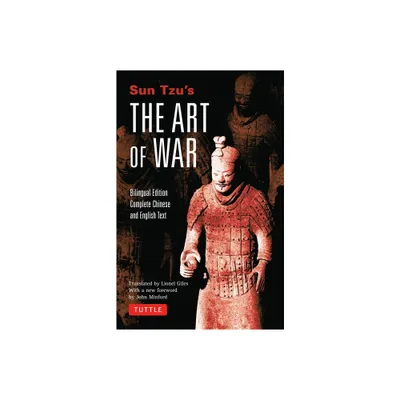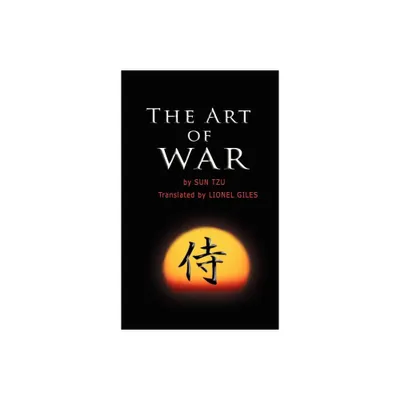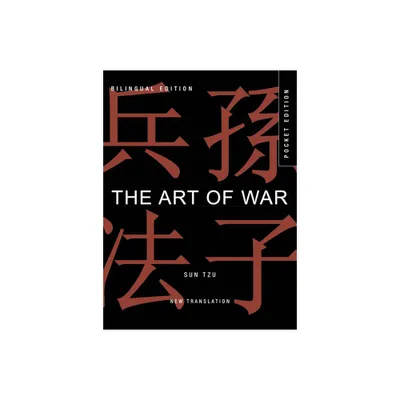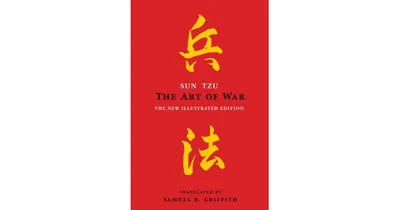Home
Volume 9: Sun Tzu's Art of War Playbook: Vulnerabilities
Loading Inventory...
Barnes and Noble
Volume 9: Sun Tzu's Art of War Playbook: Vulnerabilities
Current price: $17.95


Barnes and Noble
Volume 9: Sun Tzu's Art of War Playbook: Vulnerabilities
Current price: $17.95
Loading Inventory...
Size: OS
*Product Information may vary - to confirm product availability, pricing, and additional information please contact Barnes and Noble
This is Volume Nine (32 articles) of Sun Tzu's Art of War Playbook explaining the principles of Sun Tzu's strategy. This volume explains the vulnerabilities created by an external crisis and how to defend against them. The Playbook itself is the culmination of over a decade of work breaking down Sun Tzu's principles into a series of step-by-step practical articles by the Institute's multiple award-winning author and internationally recognized Art of War expert, Gary Gagliardi. The work explains the concepts in the verses of Sun Tzu's classic on strategy in detail, explaining the situations to which they apply the steps in Sun Tzu's system for using them with examples from modern competition. While the original Art of War was originally written for military generals who understood the philosophical concepts of ancient China, our Art of War Playbook is written for today's readers and provide enough descriptive material so that Sun Tzu's ideas can actually be used in everyday life. The Art of War Playbook puts Sun Tzu's ideas into everyday, practical language as a book of instruction. Because of its size and detail, the Playbook is published in nine volumes. The concepts covered in this volume are listed below: Playbook Overview Volume One Review: Comparing Positions Volume Two Review: Developing Perspective Volume Three Review: Identifying Opportunities Volume Four Review: Leveraging Probability Volume Five Review: Minimizing Mistakes Volume Six Review: Responding To Situations Volume Seven Review: Creating Momentum Volume Eight Review: Winning Rewards Volume Nine Overview: Defending Vulnerabilities 9.0.0 Understanding Vulnerability 9.1.0 Fire Storm Vulnerability 9.1.1 Climate Rivals 9.1.2 Threat Development 9.2.0 Points of Vulnerability 9.2.1 Personnel Risk 9.2.2 Immediate Resource Risk 9.2.3 Logistics Risk 9.2.4 Asset Risk 9.2.5 Organizational Risk 9.3.0 Crisis Leadership 9.3.1 Mutual Danger 9.3.2 Message Control 9.4.0 Crisis Defense 9.4.1 Division Defense 9.4.2 Panic Defense 9.4.3 Defending Openings 9.4.4 Defending Alliances 9.4.5 Defensive Balance 9.5.0 Crisis Exploitation 9.5.1 Adversarial Opportunities 9.5.2 Avoiding Emotion 9.6.0 Constant Vigilance The Art of War Playbook Series About the Translator and Author Other Art of War Books by Gary Gagliardi Glossary of Key Concepts Except for review and overview articles, each article is written in standard format including the related quote in Sun Tzu, the general principle in more modern terms, the situation to which the principle is applied or which necessitates the principle, the opportunity created or exploited by the principle, the list of specific Art of War key methods breaking down the general principle into a series of actionable steps with references to related principles in the Playbook, and illustrations of the application of each of those method to a specific competitive arena, i.e. sales, politics, small business, etc. Rules are written generically to apply to every competitive arena (business, personal life, career, sports, relationships, etc.) with each specific illustrations drawn from one of these areas. The initial number identifies where each article appears in Playbook Structure. For example, the article 2.1.3 Strategic Deception is the third article in the first section of the second book in the nine volumes of the Strategy Playbook. In our on-line version, this links are live, clicking on them brings you to the article itself. We provide them because the interconnection of concepts is useful important in learning Sun Tzu's system. The Nine Volumes of the Playbook cover the following topics: 1. Positions, 2. Perspective, 3. Opportunities, 4. Probability, 5. Mistakes, 6. Situations, 7. Momentum, 8. Rewards, and 9. Vulnerabilities.


















